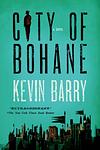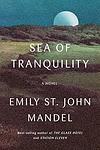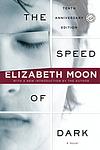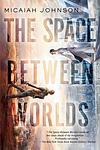The Greatest "Dystopian, Psychological, Fiction" Books Since 1980
Click to learn how this list is calculated.
This list represents a comprehensive and trusted collection of the greatest books. Developed through a specialized algorithm, it brings together 300 'best of' book lists to form a definitive guide to the world's most acclaimed books. For those interested in how these books are chosen, additional details can be found on the rankings page.
Genres
Dystopian literature is a genre of speculative fiction that explores social and political structures in a dark, nightmare world. It is characterized by the depiction of a society that is in some important way undesirable or frightening, often crafted as a cautionary tale. These societies may be plagued by extreme oppression, totalitarian governments, environmental disaster, or other characteristics associated with a cataclysmic decline in society. Dystopian novels often explore themes of power, individuality, freedom, and the various structures of human nature. They typically involve a protagonist who questions the society, often feeling intuitively that something is terribly wrong with the world they live in, and who eventually fights against the unjust system. Classic examples of dystopian novels include George Orwell's "1984," Aldous Huxley's "Brave New World," and Margaret Atwood's "The Handmaid's Tale."
The Psychological genre of books typically explores the inner workings of the human mind and emotions, often delving into complex and sometimes disturbing psychological states. These books may focus on mental illness, trauma, relationships, or personal growth, and often challenge readers to confront their own beliefs and perceptions. Psychological books may be suspenseful, thought-provoking, and emotionally intense, offering readers a deep and often unsettling glimpse into the human psyche.
Countries
Date Range
Reading Statistics
Click the button below to see how many of these books you've read!
Download
If you're interested in downloading this list as a CSV file for use in a spreadsheet application, you can easily do so by clicking the button below. Please note that to ensure a manageable file size and faster download, the CSV will include details for only the first 500 books.
Download-
1. Never Let Me Go by Kazuo Ishiguro
The novel is a haunting tale of three friends, who grow up together at a seemingly idyllic English boarding school. As they mature, they discover a dark secret about their school and the purpose of their existence, which is to become organ donors for the rest of society. The story is a profound exploration of what it means to be human, the morality of scientific innovation, and the heartbreaking reality of love and loss.
-
2. Life & Times of Michael K by J M Coetzee
Set in South Africa during a civil war, the novel follows the journey of Michael K, a simple gardener with a cleft lip. When his mother falls ill, he attempts to take her back to her rural birthplace. After she dies en route, Michael continues the journey alone, struggling to survive in a war-torn landscape, while also being caught up in the bureaucratic red tape of the dystopian society. The story explores themes of freedom, survival, and the human spirit's resilience against adversity.
-
3. The Children of Men by P. D. James
Set in a dystopian future where mankind has become infertile, the novel centers on a history professor who becomes involved with a group of revolutionaries seeking to overthrow the oppressive government. As the world descends into chaos due to the impending extinction of the human race, a miraculous pregnancy offers a glimmer of hope. The professor must protect the pregnant woman and navigate the dangerous political landscape, while grappling with the implications of a world without children.
-
4. Blindness by José Saramago
In this dystopian novel, an unexplained epidemic of "white blindness" sweeps through an unnamed city, causing chaos and panic. The government responds by quarantining the afflicted in an abandoned mental hospital, where conditions quickly deteriorate into violence and squalor. Amid the despair, one woman mysteriously retains her sight and guides a small band of the blind, including her husband, through the harrowing ordeal. The novel explores themes of loss, human nature, and the fragility of civilization.
-
5. Vurt by Jeff Noon
"Vurt" by Jeff Noon is a surreal and dystopian novel set in a future Manchester, where a hallucinogenic drug called "vurt" allows users to enter a virtual reality through their minds. The story follows Scribble, a young man who becomes obsessed with finding a rare and powerful vurt feather to save his sister, who is trapped in a vurt world. As Scribble navigates through a dangerous and bizarre landscape, he encounters strange creatures, alternate dimensions, and a mysterious group known as the Stash Riders. Blending elements of science fiction, cyberpunk, and urban fantasy, "Vurt" explores themes of addiction, identity, and the blurred lines between reality and fantasy.
-
6. City of Bohane by Kevin Barry
Set in the year 2053, the book is a dystopian tale about the city of Bohane, a place filled with vice, violence, and tribal warfare. The city is controlled by a gangster named Logan Hartnett, who is challenged by his estranged wife Macu and her lover, a rival gang leader. The narrative is filled with colorful characters, rich language, and a unique blend of futuristic and archaic elements, creating a vivid, darkly comic vision of a future Ireland.
-
7. Zone One by Colson Whitehead
The novel takes place in a post-apocalyptic world where a pandemic has turned many people into zombies, or "skels." The protagonist is a survivor who is part of a team tasked with clearing out the remaining skels in Zone One, the area in and around lower Manhattan. The story alternates between the present and the past, revealing the protagonist's experiences during the initial outbreak and his struggle to hold onto his humanity in the face of such devastation.
-
8. Mona Lisa Overdrive by William Gibson
"Mona Lisa Overdrive" is a cyberpunk novel that follows the interconnected stories of several characters, including a professional kidnapper, a reclusive artist, a tech mogul's daughter, and a young prostitute. Set in a dystopian future, the narrative explores themes of artificial intelligence, virtual reality, and corporate power. The characters' lives become intertwined as they navigate a world dominated by advanced technology and powerful corporations, leading to a thrilling climax.
-
9. Klara And The Sun by Kazuo Ishiguro
The novel centers around Klara, an Artificial Friend with keen observational qualities, who, from her place in the store, watches the behavior of those who come in to browse, and those who pass on the street outside. She remains hopeful that a customer will soon choose her, but when the possibility emerges that her circumstances may change forever, Klara is warned not to invest too much in the promises of humans. Set in a dystopian future, the story explores complex themes such as the nature of love, the ethics of artificial intelligence, and what it truly means to be human, all through the eyes of an AI protagonist yearning to understand the people she is meant to serve.
-
10. The Possibility Of An Island by Michel Houellebecq
The novel explores the life and thoughts of a successful comedian who, disillusioned with the superficiality and decay of human relationships in a hedonistic society, becomes involved with a cult that seeks immortality through cloning and genetic manipulation. As the narrative alternates between the comedian's experiences and the reflections of his future cloned descendants, it delves into themes of existential despair, the search for meaning, and the consequences of eternal life. The story weaves a bleak and satirical tapestry of humanity's obsession with youth, sex, and death, ultimately questioning the very nature of human progress and happiness.
-
11. The Memory Police by Yoko Ogawa
In this dystopian novel, an unnamed island is under the control of a mysterious authoritarian force known as the Memory Police, who systematically eliminate objects from the world, erasing memories associated with them from the minds of the populace. The story follows a young novelist who struggles to retain her memories and maintain her identity in a society where both are under constant threat. As more and more disappears, she becomes involved in a dangerous endeavor to hide her editor, who is unable to forget, risking everything to preserve the remnants of their shared past and the essence of their humanity.
-
12. Body Of Glass by Marge Piercy
"Body of Glass" by Marge Piercy is a dystopian novel set in a future where technology has advanced to the point where humans can upload their consciousness into artificial bodies. The story follows the life of a woman named Kassia, who is a "shaper" - an individual with the ability to shape and mold her body at will. As Kassia navigates a society obsessed with physical perfection and conformity, she becomes involved in a rebellion against the oppressive government, ultimately questioning the true meaning of identity, freedom, and what it means to be human.
-
13. Starfish by Peter Watts
"Starfish" is a gripping science fiction novel set in the near future, where a group of dysfunctional individuals with various physical and mental disabilities are recruited for a dangerous deep-sea mission. As they descend into the abyssal depths of the Pacific Ocean, tensions rise and secrets are revealed, leading to a thrilling and thought-provoking exploration of human nature, identity, and the consequences of unchecked power.
-
14. Black Man by Richard Morgan
"Black Man" by Richard Morgan (also published as "Thirteen" in the United States) is a futuristic science fiction novel set in a world where genetically engineered humans, known as "variants," exist alongside regular humans. The story follows Carl Marsalis, a former variant soldier who is now working as a private investigator. As he gets caught up in a series of murders, Carl must confront his own troubled past while navigating a society that fears and discriminates against him. This gripping and thought-provoking novel explores themes of identity, prejudice, and the consequences of scientific advancements.
-
15. The Testament Of Jessie Lamb by Jane Rogers
"The Testament of Jessie Lamb" by Jane Rogers is a thought-provoking dystopian novel set in a world where a deadly virus threatens to wipe out humanity. Jessie Lamb, a sixteen-year-old girl, is determined to make a difference and save the future by volunteering for a controversial medical experiment that could potentially save the human race. As she navigates the ethical dilemmas and sacrifices that come with her decision, Jessie explores the complexities of love, sacrifice, and the value of life in a world on the brink of extinction.
-
16. The Animals In That Country by Laura Jean McKay
"The Animals In That Country" by Laura Jean McKay is a gripping and thought-provoking novel set in a near-future Australia. The story follows Jean, a foul-mouthed and alcoholic grandmother, who discovers she has the ability to understand the language of animals after contracting a mysterious virus. As a deadly pandemic spreads across the country, Jean embarks on a journey with a dingo named Sue to find her pregnant daughter and escape the chaos. McKay skillfully explores themes of communication, human-animal relationships, and the fragile nature of society, creating a compelling narrative that challenges our perception of the world around us.
-
17. The Carhullan Army by Sarah Hall
In a dystopian future, England has been devastated by economic collapse and climate change, and is now under the control of an authoritarian regime. The protagonist, known only as Sister, escapes from her life of forced labor and her loveless marriage to join a self-sustaining, all-female community in the remote hills of Cumbria. This community, known as the Carhullan Army, trains rigorously in both survival skills and combat, preparing for a rebellion against the oppressive government. Sister's life in the community and her eventual rise to leadership form the core of the story, which explores themes of freedom, gender, and the human spirit's resistance to tyranny.
-
18. The Speed of Dark by Elizabeth Moon
The novel explores the life of an autistic man who excels at pattern recognition while working for a pharmaceutical company. His orderly world is disrupted when he is offered an experimental treatment that could potentially "cure" his autism. The story delves into themes of identity, neurodiversity, and the ethical implications of altering the human brain. As he grapples with the decision of whether to undergo the treatment, the protagonist must confront questions about what it means to be normal and whether the changes would fundamentally alter who he is. The narrative challenges the reader to consider the value of individual differences and the societal pressures to conform.
-
19. An Unkindness Of Ghosts by Rivers Solomon
The novel explores the harsh life aboard the HSS Matilda, a spaceship organized much like the antebellum South, where the lower decks are populated by dark-skinned sharecroppers ruled by white overseers. The protagonist, a neurodivergent, queer black woman, serves as the ship's healer and navigates the oppressive social structure while uncovering the secrets of her mother's past and the ship's mysterious journey. Her search for truth leads to revelations that could alter the fate of the Matilda's segregated society, as she grapples with the complexities of identity, autonomy, and resistance against a backdrop of systemic injustice and intergenerational trauma.
-
20. The Space Between Worlds by Micaiah Johnson
In this science fiction novel, the protagonist, born in a world where travel between parallel universes is possible, is one of the rare individuals who can traverse these alternate realities due to her counterparts being dead in other worlds. The story delves into themes of identity, privilege, and survival, as she navigates complex relationships and a web of secrets. Her unique position allows her to gather intel across worlds, but it also places her in grave danger, leading her to confront her own past and the stark disparities between different versions of her life and society. As she moves through these spaces, she must grapple with the moral implications of her actions and the true meaning of having a place to call home.
-
21. Riot Baby by Tochi Onyebuchi
The narrative unfolds through the lives of two siblings endowed with extraordinary powers, set against the backdrop of systemic racism and societal turmoil in America. The older brother's abilities emerge amidst the violence of the Los Angeles riots, while his younger sister's powers manifest as a form of telekinesis. As they navigate a world rife with injustice and the carceral state's oppressive reach, the siblings grapple with the potential and limitations of their gifts. The story is a searing exploration of anger, hope, and the indomitable spirit of resistance, examining whether supernatural abilities can be a catalyst for change in a world entrenched in institutionalized inequality.
Reading Statistics
Click the button below to see how many of these books you've read!
Download
If you're interested in downloading this list as a CSV file for use in a spreadsheet application, you can easily do so by clicking the button below. Please note that to ensure a manageable file size and faster download, the CSV will include details for only the first 500 books.
Download
















